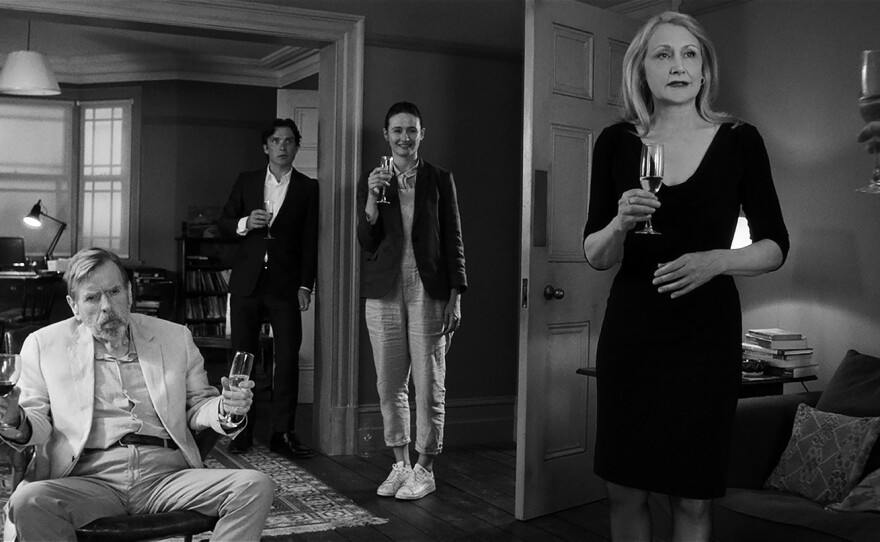Companion viewing
"Who's Afraid of Virginia Woolf?" (1966)
"Orlando" (1992)
"The Tango Lesson" (1997)
Experimental filmmaker Sally Potter delivers her most accessible and wickedly entertaining work with “The Party.”
From the opening black and white shot of “The Party” we know things will not be ending well. The first image places us at the front door of Janet’s home, the perspective being as if we were standing there waiting for our host to welcome us in. As the door opens a disheveled Janet (Kristin Scott Thomas) greets us and points a gun directly in our face. Cut to opening credits … just so we can let that shot sink in.
Then we find ourselves earlier in the evening before the night’s dinner party has begun. Bill (Timothy Spall) puts Bo Diddley’s “I’m a Man” on the record player and we sense a huge chasm between the upbeat music declaring “I’m a man, spelled M-A-N, man” and the wreck of a creature blankly staring out into space as his wife, Janet, preps food in the kitchen while answering congratulatory phone calls about her new position.
Potter doesn’t spell anything out for us but we quickly gather that the party is a celebration of Janet getting a political appointment as Health Minister, something she has been working for a long time. She welcomes her guests: April (Patricia Clarkson), her acerbic friend and her supposedly estranged boyfriend Gottfried (Bruno Ganz); Martha (Cherry Jones) and Jinny (Emily Mortimer), a lesbian couple; and Tom (Cillian Murphy), the fashionable husband of her friend Marianne (who remains unseen in the film).
April toasts the host on her recent achievement but the celebratory spirit of the evening is cut short by an unexpected and shocking announcement from Bill. Followed by a confession that thoroughly unravels the entire night and makes all the guests drop whatever shreds of decorum that they have left.
“The Party” has the feel of “Who’s Afraid of Virginia Woolf?” in terms of the savage and deliciously nasty way people who know each other all too well can open the most sensitive wounds and pour salt in.
But “The Party” is less about personal relationships and more a satire of a class of people, specifically British middle class but the criticism can carry over across the Pond. Potter serves up a comedy of socio-political manners that takes aim at politicians, academics, financiers and more. She calls them to task for ambition, greed, insincerity, hypocrisy and a host of other foibles.
The film feels a bit like a filmed stage play of the “Virginia Woolf” and “Carnage” claustrophobic kind but it was written for the screen and finds a vibrant kind of cinematic life. It is elegantly constructed and executed on every level from the stark and unflinching black and white photography to the lively editing to the absolutely flawless ensemble cast.
While so many films misjudge how long they can hold our interest, “The Party” keeps its running time to an ever so precise and jam-packed 71 minutes so that we never feel bored.
“The Party” (rated for strong crude sexual content, pervasive language, and drug use) is wicked fun and a provocative look at what feels like modern human foibles.






